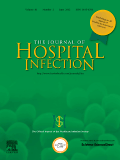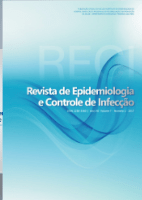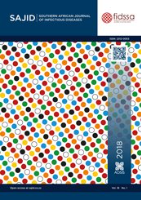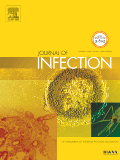
Journal of Infection and Public Health
Scope & Guideline
Championing Open Access to Groundbreaking Health Research
Introduction
Aims and Scopes
- Epidemiology of Infectious Diseases:
The journal publishes studies exploring the distribution and determinants of infectious diseases in populations, emphasizing the need for effective surveillance and intervention strategies. - Emerging Infections and Outbreak Response:
Research on emerging infectious diseases and outbreak response strategies, particularly in the context of global health security, is a core focus area, reflecting the urgent need for preparedness in public health. - Antimicrobial Resistance:
The journal addresses the growing challenge of antimicrobial resistance, publishing studies that investigate resistance mechanisms, patterns, and strategies for stewardship and management. - Public Health Interventions and Policies:
Papers that evaluate the effectiveness of public health interventions and policies aimed at controlling infectious diseases are a significant component of the journal's scope. - Clinical Management of Infectious Diseases:
Research focusing on the clinical management, treatment outcomes, and guidelines for various infectious diseases, including the role of new therapeutics and vaccination strategies, is prominently featured. - Infection Prevention and Control:
The journal emphasizes research on infection prevention and control measures within healthcare settings, aiming to improve patient safety and reduce nosocomial infections. - Global Health Perspectives:
It also seeks to incorporate global health perspectives, highlighting disparities in health outcomes and access to care across different regions and populations.
Trending and Emerging
- COVID-19 Research:
There has been a marked increase in research related to COVID-19, covering aspects such as vaccine efficacy, long COVID, and public health responses to the pandemic. - Artificial Intelligence in Disease Management:
Emerging studies on the application of artificial intelligence and machine learning in predicting and managing infectious diseases indicate a trend towards integrating technology in public health. - Mental Health Impacts of Infectious Diseases:
Research exploring the mental health impacts of infectious diseases, particularly following the COVID-19 pandemic, is gaining traction, highlighting the intersection of mental and physical health. - Vaccination Strategies and Public Acceptance:
There is a growing emphasis on research related to vaccination strategies, public acceptance, and the social determinants influencing vaccination uptake. - One Health Approach:
The integration of the One Health approach, which considers the interconnectedness of human, animal, and environmental health, is emerging as a significant theme in recent publications. - Global Health Equity:
Studies addressing health disparities and promoting equity in access to healthcare, particularly in low- and middle-income countries, are increasingly featured.
Declining or Waning
- Traditional Infectious Diseases:
There is a noticeable decline in research focusing on traditional infectious diseases such as tuberculosis and malaria, as recent publications have shifted more towards emerging infections and COVID-19-related studies. - Non-communicable Disease Interactions:
Research examining the interactions between infectious diseases and non-communicable diseases has decreased, potentially overshadowed by the urgency of addressing infectious disease outbreaks. - Longitudinal Studies:
Longitudinal studies on the long-term effects of infectious diseases or public health interventions seem to be less frequent, possibly due to the immediate focus on short-term pandemic responses. - Single Pathogen Focus Studies:
There appears to be a decline in studies focusing solely on single pathogens, as the journal increasingly favors research that evaluates co-infections and multi-pathogen interactions.
Similar Journals

Journal of Hospital Infection
Elevating Standards in Infection Control and PreventionJournal of Hospital Infection, published by W B SAUNDERS CO LTD, stands as a pivotal resource in the infectious diseases, medicine, and microbiology sectors. With an impressive impact factor positioning it in the Q1 quartile across its relevant categories, this journal not only ranks highly—#32 out of 344 in Infectious Diseases and #17 out of 140 in Medical Microbiology—but also exemplifies a commitment to advancing knowledge and practice in hospital infection control. Since its inception in 1980, the journal has become a vital platform for disseminating research that informs clinical practices, promotes safety in health care environments, and enhances medical education. While access is non-open, the journal's extensive scope and rigorously peer-reviewed contributions ensure its relevance and significance to researchers, professionals, and students aiming to stay at the forefront of this dynamic field. The journal’s headquarters in London underscores its international relevance, making it an essential reference for anyone involved in combating hospital-acquired infections.

Tropical Medicine and Infectious Disease
Exploring the frontiers of infectious disease research.Tropical Medicine and Infectious Disease, published by MDPI, is a leading peer-reviewed journal dedicated to advancing the field of tropical medicine and infectious diseases. With an open access model established since 2016, this journal fosters a collaborative environment for researchers, professionals, and students from around the world to disseminate cutting-edge findings and innovative approaches to public health challenges, particularly in tropical regions. The journal has earned recognition, achieving a Q2 quartile ranking in notable fields including Immunology and Microbiology, Infectious Diseases, and Public Health, Environmental, and Occupational Health in 2023, indicative of its influence and relevance in the scientific community. With a focus on high-quality research, Tropical Medicine and Infectious Disease aims to bridge the gap between basic science and clinical application, providing invaluable insights critical for combating infectious diseases and improving health outcomes in vulnerable populations. The journal’s accessibility and substantial indexing in major databases further solidify its importance as a key platform for impactful research in this essential field.

Revista de Epidemiologia e Controle de Infeccao
Exploring Innovations in EpidemiologyRevista de Epidemiologia e Controle de Infeccao, published by Universidade de Santa Cruz do Sul, stands as a vital resource for scholars and practitioners in the fields of epidemiology and infection control. This open-access journal, available since 2011, fosters the dissemination of high-quality research and practice-based knowledge aimed at enhancing public health and improving infection management strategies. With its commitment to sharing invaluable insights from Brazil and beyond, the journal encourages broader participation in critical discussions surrounding infectious diseases. Although specific metrics such as the HIndex and Scopus rankings are currently omitted, the journal's relevance is underscored by its open accessibility, allowing a global audience of researchers, healthcare professionals, and students to engage with innovative studies and findings in this essential area of public health.

Klimik Journal
Advancing Infectious Disease Insights.Klimik Journal is a pivotal publication in the fields of Infectious Diseases and Medical Microbiology, serving as a platform for researchers, clinicians, and academics to disseminate groundbreaking findings and improve health outcomes. Established in 2010 and published by DOC DESIGN INFORMATICS CO LTD, this journal is dedicated to advancing knowledge and fostering discussions around critical issues in infectious diseases and microbial research. With an ISSN of 1301-143X and an E-ISSN of 1309-1484, Klimik Journal strives to maintain high academic standards despite currently ranking in the fourth quartile in both categories according to Scopus metrics, which highlights the need for continued contributions to the field. Operating from Turkey, the journal is committed to supporting open access options, thereby ensuring wide dissemination of research findings. As it continues to bridge the gap between theory and practice, Klimik Journal is poised to become an essential resource for those looking to stay at the forefront of infectious disease research and microbiological advancements.

Southern African Journal of Infectious Diseases
Connecting knowledge to combat infectious diseases.Southern African Journal of Infectious Diseases is a pivotal platform for the dissemination and advancement of research in the field of infectious diseases, with a particular focus on issues significant to the Southern African region. Published by AOSIS, this Open Access journal has been committed to providing accessible scholarly content since 2016, enabling researchers and practitioners to stay updated with the latest developments in infectious disease epidemiology, prevention, and management. With the ISSN 2312-0053 and E-ISSN 2313-1810, the journal invites submissions that explore diverse topics, including but not limited to clinical studies, public health policies, and innovative treatment methodologies. The Southern African Journal of Infectious Diseases is an essential resource for academics, professionals, and students dedicated to combating infectious diseases and improving health outcomes in the region, fostering a collaborative approach to research and knowledge sharing.

International Journal of Antimicrobial Agents
Uncovering Breakthroughs in Medical PharmacologyInternational Journal of Antimicrobial Agents, published by Elsevier, stands as a premier platform in the fields of Infectious Diseases, Microbiology, and Medical Pharmacology. With an impressive impact factor and ranked in the Q1 category across multiple medical disciplines in 2023, this journal is recognized for its contribution to advancing knowledge and understanding in the efficacy and safety of antimicrobial treatments. Its comprehensive scope from 1991 to 2024 allows for the publishing of original research, reviews, and commentary on pressing issues related to antimicrobial resistance, treatment strategies, and pharmacological innovations. With a strong emphasis on high-quality research as reflected in its Scopus rankings, the journal is an essential resource for researchers, clinicians, and students dedicated to improving patient outcomes in the face of evolving microbiological challenges. Engage with the latest findings and methodologies through this vital academic resource, available in print and online, from the heart of the Netherlands.

JOURNAL OF INFECTION
Exploring Innovations in Microbial ResearchJOURNAL OF INFECTION is a premier academic publication in the fields of infectious diseases and medical microbiology, published by W B SAUNDERS CO LTD. With a profound impact factor and established since 1979, this journal serves as a crucial resource for researchers, clinicians, and policy-makers seeking to advance knowledge and understanding of infectious processes and their management. The JOURNAL OF INFECTION holds an impressive position in the academic hierarchy as reflected by its Q1 quartile rankings in both Infectious Diseases and Microbiology (medical) for 2023, further underscored by its Scopus rankings: #2 in Medical Microbiology and #5 in Medical Infectious Diseases, placing it in the 98th percentile overall. While the journal does not offer Open Access options, it provides a comprehensive outlet for innovative research, reviews, and clinical insights that drive the field forward. Published from the United Kingdom, it attracts a global readership keen on staying at the forefront of infectious disease research, making it an essential addition to any academic and clinical library.

Infection Prevention in Practice
Exploring the forefront of infection control and public health.Infection Prevention in Practice is a leading academic journal published by ELSEVIER that has established itself as a vital resource in the domains of Infectious Diseases and Public Health. With its Open Access policy implemented since 2019, the journal enhances global accessibility to cutting-edge research and practical insights aiming to reduce the risk of infections in various settings. It proudly holds a Q3 ranking in Infectious Diseases and a Q2 ranking in Public Health, Environmental and Occupational Health as of 2023, showcasing its impact and relevance within the scientific community—particularly with a Scopus rank placing it in the 71st percentile for public health research. Its scope includes the latest advancements, strategies, and practices in infection prevention, making it an indispensable read for researchers, healthcare professionals, and students dedicated to improving health outcomes and combating infectious diseases effectively. The journal operates from its base in the United Kingdom and reaches a global audience, fostering collaboration and innovation in infection control practices.

Current Infectious Disease Reports
Elevating the Standard of Infectious Disease ReportingCurrent Infectious Disease Reports, published by SPRINGER, is a leading journal dedicated to advancing knowledge in the field of infectious diseases. With an ISSN of 1523-3847 and an E-ISSN of 1534-3146, this peer-reviewed journal has established itself as a vital resource for researchers and healthcare professionals since its inception in 1999. The journal's impact in the academic community is underscored by its Q1 ranking in Infectious Diseases for 2023, placing it in the top quartile of influential journals in the field. Furthermore, it holds a respectable position at rank #95 out of 344 in the Scopus database, reflecting its substantial contribution to medicine and public health. While currently not an open access journal, it offers a wealth of articles covering the latest research, case studies, and reviews, making it an indispensable tool for those aiming to stay at the forefront of infectious disease science. As we navigate an era marked by emerging and re-emerging infectious threats, Current Infectious Disease Reports remains committed to providing high-quality, relevant research that supports evidence-based practice and informs future studies globally.

Eurosurveillance
Shaping the future of infectious disease response.Eurosurveillance is a prestigious journal dedicated to the field of epidemiology, public health, and infectious diseases, published by the European Centre for Disease Prevention and Control since 1996. With an impressive Q1 ranking across various categories, including Epidemiology and Public Health, it consistently stands at the forefront of research dissemination, making it an invaluable resource for researchers, professionals, and students alike. The journal boasts an outstanding reputation, as evidenced by its Scopus rankings, where it ranks in the top 1% to 3% in multiple relevant categories. As an Open Access publication, Eurosurveillance ensures that vital findings are freely accessible to a global audience, fostering collaboration and innovation in the fight against infectious diseases. With a dedicated reach from 2001 to 2024, the journal addresses contemporary challenges in public health and virology, reinforcing its significance in shaping policies and research initiatives across the world.